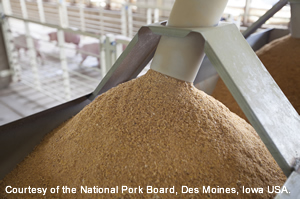New Fact Sheet Looks at Additives to Mitigate Risk of Virus-contaminated Feed
2/25/22
 AMES, Iowa – Research trials have documented that viruses important to the swine industry can survive in feed ingredients and complete feed for transcontinental (23 days) and transoceanic (30 & 37 days) shipping. As biosecurity awareness and protocols have increased for animals, people and equipment, feed and feed ingredients may also be routes of virus transmission to be managed.
AMES, Iowa – Research trials have documented that viruses important to the swine industry can survive in feed ingredients and complete feed for transcontinental (23 days) and transoceanic (30 & 37 days) shipping. As biosecurity awareness and protocols have increased for animals, people and equipment, feed and feed ingredients may also be routes of virus transmission to be managed.
A new fact sheet from Iowa Pork Industry Center, Feed Additives to Mitigate the Risk of Virus-contaminated Feed, focuses on three research papers that evaluated compounds to mitigate virus-contaminated feed. Iowa State University extension swine specialist Mark Storlie is one of the authors. He described these compounds and the specifics for each paper.
"The compounds are classified into two different groups. Foreign Animal Disease (FAD) viruses: African Swine Fever (ASF) and Foot and Mouth Disease (FMD); and Domestic viruses: Porcine Reproductive and Respiratory Syndrome virus (PRRSV), Senecavirus A (SVA) and Porcine Epidemic Diarrhea virus (PEDV) are discussed," he said. "The experimental design, feed additive or compound evaluated and results for specific viruses are highlighted for each paper."
A specific mode of action is not identified. While some products mitigate the viral load or/and viability in the feed, other products may support the immune system, gut environment or something yet to be determined to support pig productivity similar to non-challenged pigs.
"This is exciting research to identify tools which may help reduce or address specific viruses in swine production," Storlie said. "Each operation will need to evaluate the cost/benefit to incorporate these products into their feeding program. A source for product formulations, company contacts and relative pricing is highlighted to encourage producers to learn more."
Chris Rademacher, Iowa State Extension swine veterinarian, and Scott Dee with Pipestone Research are the other authors of this fact sheet.
Download the six-page pdf publication IPIC 201 at no charge from the ISU Extension store.
-30-
IPIC was established in 1994 as a coordinated effort of the colleges of Agriculture (now Agriculture and Life Sciences) and Veterinary Medicine at ISU. Its mission is to promote efficient pork production technologies in Iowa, maintain Iowa's pork industry leadership and strengthen rural development efforts. IPIC focuses its efforts on programs that are integral and complementary to ISU Extension and Outreach. Through IPIC, Iowa producers receive accurate and timely information to make their operations more efficient and profitable.
Contact
Mark Storlie
Swine Specialist
Writer
Sherry Hoyer
Communications Specialist

